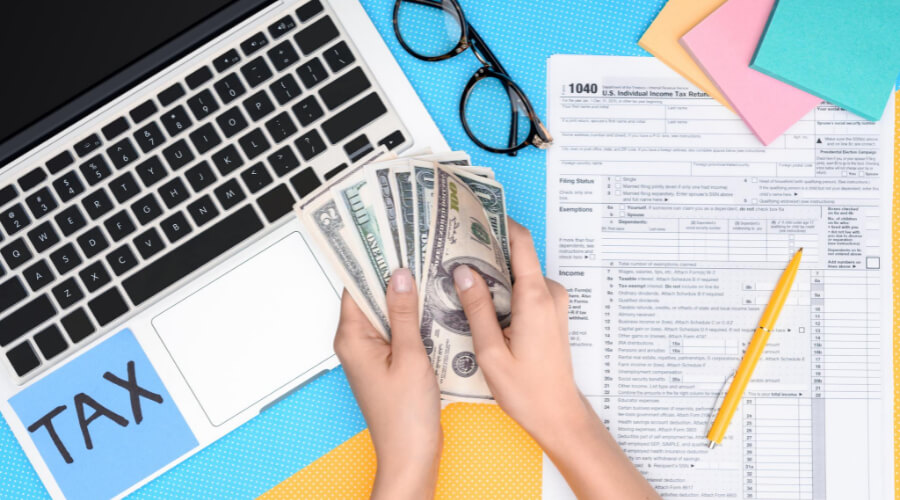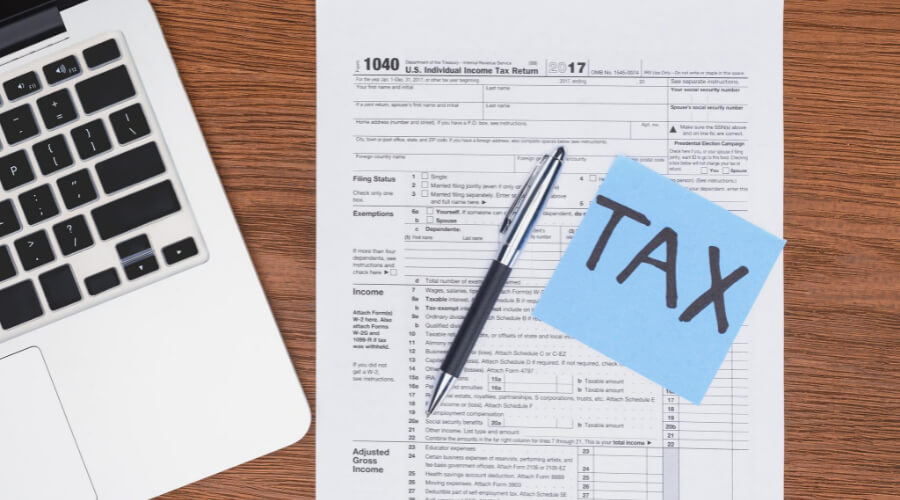Taxes are the primary source of income for a government and property tax is one of the most important tax sources for a government. The property tax is calculated by local governments and paid by homeowners. However, if you ask the homeowners about the property taxes they will say they are paying too much for their property. So is there any way to avoid paying the property tax legally?
There are many ways you can avoid paying property tax legally. You can consider holding your property within a limited company and if your state has a higher tax rate then this is a great way to avoid paying extra property tax. Moreover, you can transfer property to your spouse and avoid paying the property taxes. You can also change your property to an offset buy-to-let mortgage or you can increase the rent of your property to cover the property taxes.
What Is Property Tax?

Property tax is a type of tax that a landowner has to pay annually to the local government or the municipal corporation of his area. Whether you are an individual landowner or other legal entity, such as a corporation you have to pay the tax of your land. So, property tax is actually a type of real estate tax that you have to pay for your property, office buildings, and residential homes that are rented out to third parties, etc. The property tax is calculated based on the value of the owned property, including land. There are for types of property. They are:
1. Personal property
2. Land
3. Improvements made to land
4. Intangible property
How Does Property Tax Work?
Usually, the property tax is determined by multiplying the property tax rate by the current market value of the lands in a specific area. The property tax rate is recalculated every year so it can be increased or decreased compared to the last year. You have to pay property taxes for only the real property that including the land, structures, or other fixed buildings. According to Investopedia –
“Property owners are subject to the rates determined by the municipal government. A municipality will hire a tax assessor who assesses the local property. In some areas, the tax assessor may be an elected official. The assessor will assign property taxes to owners based on current fair market values. This value becomes the assessed value for the home.”
The payment schedule of property taxes will vary depending on the states your property is in and as an owner, you can discuss the tax rate with the assessor or formally contest the rate. If you don’t pay the property tax then the authority can assign a lien against the property. Therefore, buyers always have to complete a full review of outstanding liens before they can purchase any property.
5 Ways To Legally Avoid Paying Property Taxes

Here are some of the ways that you can use to legally avoid paying property taxes. Moreover, you will be able to maximize the income that you earn from your property rentals. Let’s check them out!
Hold Your Company Within A Limited Company
Usually, landowners don’t consider renting out property to be a business. They like to use their land as a supplemental income alongside another job or consider it as a retirement fund. Owners with only one or two rental properties alongside their main residence things like that. However, it is wiser to consider the tax advantages of setting up a company to invest in property. If you are a higher-rate or additional-rate property taxpayer then this is a great solution for you.
According to the new property tax law, the mortgage interest costs will no longer be deductible from the income tax of a landowner but companies are exempt from this law. So if you rent your land or property to a company then you can easily deduct mortgage interest costs from your property tax. Moreover, corporation tax is lower than property tax so it is a win-win situation for both parties.
Transfer The Property To Your Spouse
This is also a great way to avoid the property tax legally. You can gift or sell the property to your wife, husband, or civil partner, and this way you don’t have to pay the property tax. Moreover, you can use this method to reduce or even eliminate the tax on the rental income of your property. Also, if the income from the property is the only income source of your spouse then it will only be taxed at 20 percent on income above the threshold up to a maximum of $50,000. However, this law and interest can vary depending on the state your property is in.
Make The Most Of Allowable Expenses
You can exempt the allowable expenses from your property income tax. Usually, the allowable expenses include property maintenance and repair costs, replacing furnishings, cost of leasehold ground rents, wages of cleaners and gardeners, vehicle mileage, insurance costs, and many more. So you must keep all the receipts and records of the cost if you want to substantiate any claims for allowable expenses. It will help you stop paying unnecessary property tax.
Increase The Rent Of Your Property
Increasing the rent of your property won’t help you avoid paying the property tax but it will help you cover the property tax. Though it’s not easy to increase the rent of a property nowadays many landlords are not showing interest in renting the property so the demand for rental property is increasing and thus you can increase the rent of your property. If the property tax is increased then it will adversely affect your profits especially if you have large mortgages held against you. So increasing the rent can save you from the profit loss. However, you have to ensure that your rental value is comparable to others in your area or you will struggle a lot to rent your property. You should include a rent review option on your rental contract as it will help you re-assess the rent every year or when required.
Change To An Offset Buy-To-Let Mortgage
Well, this method has limited availability but it is worth trying this method. Offset buy-to-let mortgage will help you to reduce the amount of mortgage interest you pay for your property. From 2021, the mortgage interest payments cannot be offset against property income so offset buy-to-let mortgages can help you avoid paying extra property tax. So it is a wise decision to invest the income from the property to offset the mortgage savings account. The less mortgage interest you pay the more profit you can generate from your property.
List Of US Cities With Highest Property Tax Rates

Milwaukee, Wisconsin
- Effective property tax rate: 2.17%
- Median property taxes paid: $3,122
- Median home value: $133,600
- Median household income (owner-occupied homes): $66,465
El Paso, Texas
- Effective property tax rate: 2.13%
- Median property taxes paid: $3,136
- Median home value: $133,600
- Median household income (owner-occupied homes): $61,830
Fort Worth, Texas
- Effective property tax rate: 1.86%
- Median property taxes paid: $4,155
- Median home value: $209,400
- Median household income (owner-occupied homes): $85,273
San Antonio, Texas
- Effective property tax rate: 1.85%
- Median property taxes paid: $3,260
- Median home value: $171,100
- Median household income (owner-occupied homes): $70,938
Arlington, Texas
- Effective property tax rate: 1.75%
- Median property taxes paid: $3,889
- Median home value: $213,800
- Median household income (owner-occupied homes): $83,119
Omaha, Nebraska
- Effective property tax rate: 1.71%
- Median property taxes paid: $3,283
- Median home value: $175,800
- Median household income (owner-occupied homes): $82,650
Columbus, Ohio
- Effective property tax rate: 1.62%
- Median property taxes paid: $2,776
- Median home value: $173,300
- Median household income (owner-occupied homes): $77,951
Austin, Texas
- Effective property tax rate: 1.53%
- Median property taxes paid: $6,616
- Median home value: $378,300
- Median household income (owner-occupied homes): $114,776
Cleveland, Ohio
- Effective property tax rate: 1.51%
- Median property taxes paid: $1,508
- Median home value: $71,100
- Median household income (owner-occupied homes): $47,562
Dallas, Texas
- Effective property tax rate: 1.49%
- Median property taxes paid: $3,840
- Median home value: $231,400
- Median household income (owner-occupied homes): $77,286
List Of US Cities With Lowest Property Tax Rates
Colorado Springs, Colorado
- Effective property tax rate: 0.48%
- Median property taxes paid: $1,375
- Median home value: $318,200
- Median household income (owner-occupied homes): $89,230
Denver, Colorado
- Effective property tax rate: 0.49%
- Median property taxes paid: $2,118
- Median home value: $447,500
- Median household income (owner-occupied homes): $103,069
Mesa, Arizona
- Effective property tax rate: 0.57%
- Median property taxes paid: $1,343
- Median home value: $259,300
- Median household income (owner-occupied homes): $77,774
San Francisco, California
- Effective property tax rate: 0.57%
- Median property taxes paid: $7,678
- Median home value: $1,217,500
- Median household income (owner-occupied homes): $151,654
Phoenix, Arizona
- Effective property tax rate: 0.58%
- Median property taxes paid: $1,537
- Median home value: $266,600
- Median household income (owner-occupied homes): $80,217
Washington, District of Columbia
- Effective property tax rate: 0.58%
- Median property taxes paid: $3,647
- Median home value: $646,500
- Median household income (owner-occupied homes): $147,678
Boston, Massachusetts
- Effective property tax rate: 0.58%
- Median property taxes paid: $3,667
- Median home value: $627,000
- Median household income (owner-occupied homes): $132,762
Las Vegas, Nevada
- Effective property tax rate: 0.59%
- Median property taxes paid: $1,698
- Median home value: $305,900
- Median household income (owner-occupied homes): $81,125
Aurora, Colorado
- Effective property tax rate: 0.60%
- Median property taxes paid: $1,793
- Median home value: $343,000
- Median household income (owner-occupied homes): $87,867
Nashville-Davidson, Tennessee
- Effective property tax rate: 0.60%
- Median property taxes paid: $1,797
- Median home value: $287,300
- Median household income (owner-occupied homes): $83,852
FAQs About Property Tax
1. Who Are Qualified For Property Tax Exemptions?
The property tax exemptions applied for –
1. Seniors
2. Veterans
3. People with certain disabilities
4. Agriculture properties
5. Homestead exemptions
6. Renovations
7. Energy Incentives
2. Do You Still Have To Pay Property Taxes If You Leave The US?
If you are a US citizen then you have to pay the property tax regardless you live in the US or not.
3. Who Is Liable For Local Property Tax?
You will be liable for the local property tax if you are the owner of the property. Every property has a property identification number for the local property tax process.
4. What Type Of Policy Is LPT?
The local property tax (LPT) is a self-assessed policy and if you are the property owner then you will be charged according to the market value of residential properties in your area.
References:
1. https://www.investopedia.com/articles/pf/07/property_tax_tips.asp
2. https://www.houseloanblog.net/how-to-lower-property-taxes/
Last Updated on February 3, 2022 by

Magalie D. is a Diploma holder in Public Administration & Management from McGill University of Canada. She shares management tips here in MGTBlog when she has nothing to do and gets some free time after working in a multinational company at Toronto.





